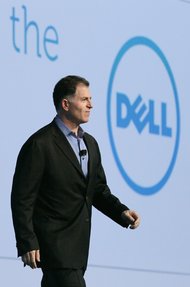 Justin Sullivan/Getty ImagesThe decision to take Dell private puts the company more firmly under the control of Michael S. Dell.
Justin Sullivan/Getty ImagesThe decision to take Dell private puts the company more firmly under the control of Michael S. Dell.
Dell announced on Tuesday that it had agreed to go private in a $24 billion deal led by its founder and the investment firm Silver Lake, in the biggest leveraged buyout since the financial crisis.
Under the terms of the deal, the buyers’ consortium, which also includes Microsoft, will pay about $13.65 a share. That is roughly 25 percent above where Dell’s stock traded before word emerged of the negotiations of its sale.
Dell’s board is said to have met on Monday night to vote on the deal.
As a newly private company — now more firmly under the control of Michael S. Dell, who is contributing his stake of nearly 16 percent to the deal — the computer maker will seek to revive itself after years of decline. The takeover represents Mr. Dell’s most drastic effort yet to turn around the company he founded in a college dormitory room in 1984 and expanded into one of the world’s biggest sellers of personal computers.
But the advent of new competition, first from other PC manufacturers and then smartphones and the iPad, severely eroded Dell’s business. Such is the concern about the company’s future that Microsoft agreed to lend some of its considerable financial muscle to shore up one of its most important business partners.
Analysts have expressed concern that even a move away from the unyielding scrutiny of the public markets will let Mr. Dell accomplish what years of previous turnaround efforts have not.
Nevertheless, the transaction represents a watershed moment for the private equity industry, reaching heights unseen over the past five years. It is the biggest leveraged buyout since the Blackstone Group‘s $26 billion takeover of Hilton Hotels in the summer of 2007, and is supported by more than $15 billion of debt financing raised by no less than four banks.
Article source: http://dealbook.nytimes.com/2013/02/05/dell-sets-23-8-billion-deal-to-go-private/?partner=rss&emc=rss







